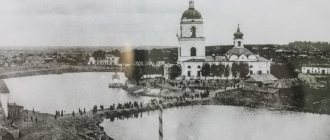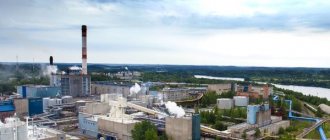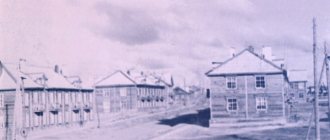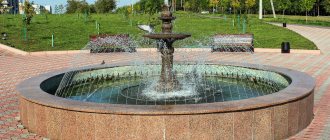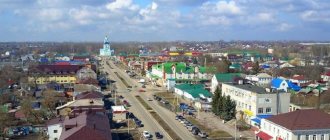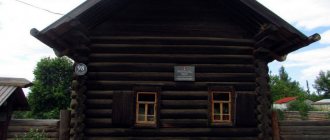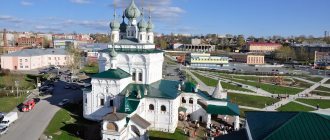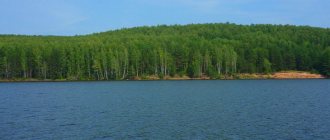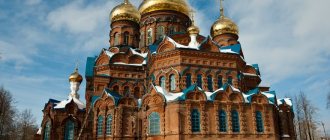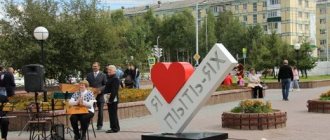Ministry of General and Professional Education of the Sverdlovsk Region.
Municipal educational institution
"Secondary school No. 10"
Population of Kushva.
Kushva
2005
Dear readers,
you are already studying the geography of Russia and the Sverdlovsk region. Here is one of the chapters of the book “Geography of Kushva”. Many of you were born and raised in this city. Here you are faced with the problem of choosing a life path. Where will you live next? In your hometown or will you change your place of residence? What is so attractive about our city? Does it have prospects for further development? I would like to give the answer to this question on the pages of my textbook. Or maybe, after reading it, you will understand how to make our city better and happier.
My students also took part in the work on this project: Sakhautdinova Alfiya and Zakharova Tanya. The head of the city statistics department, the chief geologist of the Goroblagodatsky mine, specialists from the Department of Architecture of the Administration of the Municipal District of Kushva and
I hope that the material collected here will help you study the geography of your native land and make you think about the problems. Of course, the geography of a small town is a piece of the geography of our Motherland. I would really like that, using this manual, you could love our city even more, realize its advantages and disadvantages and make it better.
Teacher 1st category
Municipal educational institution secondary school No. 10
The city of Kushva is a typical provincial Ural city. And even more than that: this is an example that most clearly and concisely shows all the main features of the Ural city, genetically connected with the history of the mining industry of the Urals. There are natural monuments and a man-made park, industrial enterprises and unique scientific institutions here. It combines the culture of the aborigines (Mansi), the Russians who came to the Urals, and the European (foreign) culture brought here by the associates of Peter 1. Here you can see the consequences of an environmental disaster and unique relict forms of plants preserved from the beginning of time.
The territory of the municipal formation, the city of Kushva, is located on a watershed; the border of Europe and Asia, marked by several signs, passes through the area. Its area is 2.48 thousand km 2. The length of the territory from north to south is 65 km, and from west to east 62 km. Kushva is a city of regional subordination, located 198 km from the regional center and 50 km north of Nizhny Tagil, at the intersection of two railways - Sverdlovsk-Serov, Sverdlovsk-Perm, on both banks of the river. Kushva and the pond formed by it, at the foot of Mount Grace. The area of the city is 68,249 km2. Geographical coordinates of Kushva: 58010/s. w. 59040/v. d.
The city is administratively subordinate to a vast territory, which includes the villages of Baranchinsky, Valuevsky, Asian, Verkhnyaya Barancha, Orulikha, Sofyanka, Khrebet-Uralsky, Chekmen; villages Borovaya, Mostovaya, Molochnaya, Kedrovka. Here in 2004 58.3 thousand people lived.
According to the nature of the relief, the territory of the municipal municipality of Kushva is divided into two meridional zones - western and eastern. The western zone, which is transitional from the high-mountainous part of the Middle Urals to the lower ones, is distinguished along the western border of the region and spatially coincides with the main intrusions of the platinum belt of the Urals. The maximum absolute elevations here are 450-490m, the minimum 180-200m. The shape of the hills is smoothed, their slopes are covered with turf. Only on the peaks and rarely on the slopes are rocky denudation remnants noted. Low-lying areas are usually swampy.
The eastern zone has a ridgey character. The absolute elevations of the ridges rarely exceed 250-260m, while the relative elevations are 50-60m. Low areas are usually swampy. In general, the area has a slight slope of the surface to the east. The area is not seismic. Mineral resources are represented by iron ores (magnetites), refractory clays, and construction raw materials.
The climate of the territory is continental, as evidenced by annual and daily fluctuations of almost all meteorological elements. The seasons of the year are clearly defined, the weather is not stable. The formation of climate is influenced by the barrier position of the Ural ridge, which retains warm, wet winds from the west and cold, dry winds from the east. The climate of the Moscow Region is continental with cold, long, snowy winters and short, rainy summers. The main role in the distribution of precipitation belongs to the Ural ridge, which retains most of it on the western slope. The amount of precipitation varies greatly from year to year. In rainy years it falls up to 671.9 mm, in dry years up to 355.6 mm. Most of the precipitation occurs in the warm season, which has a beneficial effect on the development of vegetation. Winter lasts 5-6 months. Snow cover sets in at the end of October - beginning of November. In February March it reaches a maximum thickness of up to 40 cm. snowmelt ends in the second half of April. There is no permafrost. The average long-term evaporation amount is 84% of the amount of precipitation.
Located in the taiga natural zone. According to forest management zoning, the territory belongs to the middle taiga forests of the Middle Ural low-mountain province. The taiga composition is typical for woody vegetation. The forests contain cedar, pine, larch, spruce, and fir; from soft deciduous species - birch, linden, aspen, gray alder and tree willow.
The origin of soil-forming rocks is associated with the weathering of very numerous and varied rocks (granites, shales, limestones). The most common soils in terms of mechanical composition (up to 80% of the enterprise area) include loamy and clayey soils. The region of the Ural ridge is represented by typically podzolic sod-podzolic crushed stone soils on eluvium and colluvium of carbonate and acidic soils. There are also mountain meadow, podzolic, crushed stone soils, often swampy. All of the above determines the presence of soils of various genetic types in the territory.
Analyzing the soils, we can draw conclusions: the forest area is suitable for growing forests, it is 92.7%, non-forest area is 7.3%. The majority of the non-forest area (46.2%) is occupied by hayfields, the areas of which are used for hay harvesting by the forestry enterprise and by the population.
The hydrographic network of the region is represented by small rivers and streams, which often dry up in summer and completely freeze in winter. Rivers are fed by surface runoff of summer precipitation and snowmelt. The watercourses of the area belong to the Tura River basin. The Tura River originates on the eastern slope of the Ural Range, 25 km northwest of the city of Kushva. In the town of Verkhnyaya Tura it is blocked by a dam. The Kushva River is a right tributary of the river. Tours is about 27 km long. Its sources are located 15 km southwest of the city of Kushva. Within the city, the river is blocked by a dam. The pond has an area of 3.2 km2. The Barancha River, a left tributary of the Tagil River, its sources are located 16.5 km west of the city of Kushva and 9.6 km from the village. Upper Barancha. The river is twice blocked by dams: in the village. Upper Barancha it forms a pond with an area of 35 hectares, in the village. Baranchinsky is a pond with an area of 110 hectares. The reservoirs are free of ice in early May and are suitable for swimming in the summer; due to the shallow depth, the water in the ponds warms up to 20-230C by mid-July. The duration of the swimming season is 3 months (June-September). Ice cover is established at the end of November.
Kushva with its surroundings forms an important industrial part of the Tagil-Kachkanar industrial region and the emerging Nizhny Tagil urban agglomeration. For the development of the economy, iron ore deposits are of great importance, which supply the powerful metallurgy of the entire industrial region. Therefore, Kushva has very close production and technological ties with the core of the industrial region - Nizhny Tagil.
General information
Those traveling around Russia and choosing an industrial city to visit will have to head to the Urals. After all, the city of Kushva is the Sverdlovsk region, and this is the Ural Federal District with the administrative center in Yekaterinburg. This is a small city with a population of about 28 thousand people. It is noteworthy that from the Komi-Permyak dialect the name Kushva is translated as “rotten water”.
Kushva begins its history in 1735, when huge deposits of iron were discovered in the depths of its land.
When forming all the details of the trip, you need to take into account that the clocks in Kushva are set two hours ahead.
Notes
- ↑ 12
www.gks.ru/free_doc/doc_2016/bul_dr/mun_obr2016.rar Population of the Russian Federation by municipalities as of January 1, 2016 - [www.oblgazeta.ru/society/21487/ This day in the history of the Sverdlovsk region is January 21]
- ↑ 12345678910111213
www.MojGorod.ru/sverdlov_obl/kushva/index.html People's encyclopedia “My City”. Kushva - [demoscope.ru/weekly/ssp/rus59_reg2.php All-Union Population Census of 1959. The size of the urban population of the RSFSR, its territorial units, urban settlements and urban areas by gender] (Russian). Demoscope Weekly. Retrieved September 25, 2013. [www.webcitation.org/6GDOghWC9 Archived from the original on April 28, 2013].
- [demoscope.ru/weekly/ssp/rus70_reg2.php All-Union Population Census of 1970 The size of the urban population of the RSFSR, its territorial units, urban settlements and urban areas by gender.] (Russian). Demoscope Weekly. Retrieved September 25, 2013. [www.webcitation.org/6GDOiMstp Archived from the original on April 28, 2013].
- [demoscope.ru/weekly/ssp/rus79_reg2.php All-Union Population Census of 1979 The size of the urban population of the RSFSR, its territorial units, urban settlements and urban areas by gender.] (Russian). Demoscope Weekly. Retrieved September 25, 2013. [www.webcitation.org/6GDOjhZ5L Archived from the original on April 28, 2013].
- [demoscope.ru/weekly/ssp/rus89_reg2.php All-Union Population Census of 1989. Urban population]. [www.webcitation.org/617x0o0Pa Archived from the original on August 22, 2011].
- [www.perepis2002.ru/ct/doc/1_TOM_01_04.xls All-Russian Population Census 2002. Volume. 1, table 4. Population of Russia, federal districts, constituent entities of the Russian Federation, districts, urban settlements, rural settlements - regional centers and rural settlements with a population of 3 thousand or more]. [www.webcitation.org/65AdCU0q3 Archived from the original on February 3, 2012].
- [www.gks.ru/bgd/regl/b08_14t/IssWWW.exe/Stg/ur/03-00.htm Administrative-territorial division of the Sverdlovsk region as of January 1, 2008]. Retrieved May 11, 2016. [www.webcitation.org/6hQQf5WLh Archived from the original on May 11, 2016].
- [www.gks.ru/bgd/regl/B09_109/IssWWW.exe/Stg/d01/tabl-21-09.xls Number of permanent population of the Russian Federation by cities, urban-type settlements and districts as of January 1, 2009]. Retrieved January 2, 2014. [www.webcitation.org/6MJmu0z1u Archived from the original on January 2, 2014].
- [sverdl.gks.ru/wps/wcm/connect/rosstat_ts/sverdl/resources/c081bf004cb2e2e8b07efb98f842dd0b/number and distribution of the population of the Sverdlovsk region.rar All-Russian population census 2010. Number and distribution of the population of the Sverdlovsk region]. Retrieved June 1, 2014. [www.webcitation.org/6Q0e0rzaI Archived from the original on June 1, 2014].
- [www.gks.ru/free_doc/doc_2012/bul_dr/mun_obr2012.rar Population of the Russian Federation by municipalities. Table 35. Estimated resident population as of January 1, 2012]. Retrieved May 31, 2014. [www.webcitation.org/6PyOWbdMc Archived from the original on May 31, 2014].
- [www.gks.ru/free_doc/doc_2013/bul_dr/mun_obr2013.rar Population of the Russian Federation by municipalities as of January 1, 2013. - M.: Federal State Statistics Service Rosstat, 2013. - 528 p. (Table 33. Population of urban districts, municipal districts, urban and rural settlements, urban settlements, rural settlements)]. Retrieved November 16, 2013. [www.webcitation.org/6LAdCWSxH Archived from the original on November 16, 2013].
- [www.gks.ru/free_doc/doc_2014/bul_dr/mun_obr2014.rar Table 33. Population of the Russian Federation by municipalities as of January 1, 2014]. Retrieved August 2, 2014. [www.webcitation.org/6RWqP50QK Archived from the original on August 2, 2014].
- [www.gks.ru/free_doc/doc_2015/bul_dr/mun_obr2015.rar Population of the Russian Federation by municipalities as of January 1, 2015]. Retrieved August 6, 2015. [www.webcitation.org/6aaNzOlFO Archived from the original on August 6, 2015].
- taking into account the cities of Crimea
- [www.gks.ru/free_doc/doc_2016/bul_dr/mun_obr2016.rar Population of the Russian Federation by municipalities as of January 1, 2016. Table “31. Population of cities and towns by federal districts and constituent entities of the Russian Federation as of January 1, 2016.” RAR archive (1.0 MB)]
Mineral deposits
The city of Kushva in the Sverdlovsk region arose due to the discovery of rich deposits of magnetic iron ore in the depths of Mount Blagodat. In 1735, this discovery was made by local hunter Stepan Chumpin. He brought several samples of ore to one of the bosses. A commission was assembled, which after some time confirmed the presence of iron, and of very good quality. In the autumn of the same year, the head of the factories, Vasily Tatishchev, gave the mountain where the ore was mined the name Grace in honor of Empress Anna Ioannovna. The name Anna is translated from Hebrew as “grace.”
The construction of mining plants began. To work in the mines, peasants from many regions of the Russian Empire were driven to Blagodati, as well as Tatars, who were recruited and brought to Kushva.
Development of the field continued until 2003. In the same year, all work was stopped due to the complete depletion of the field. The shutdown of all enterprises hit the economy and population of the city of Kushva hard. Ore mining was the main activity here.
The role of Kushva during wars
The history of the city of Kushva during the period of Soviet power is full of sad events. The Civil War of 1918-1919 caused great damage. The city was an important strategic point in the Urals.
After fierce fighting, the city was taken by the Whites. In 1919, units of the Red Army were still able to drive the invaders out of the territory. However, along with the liberation from the enemies of the people by the Reds, destruction and vandalism came to Kushva.
One of the most difficult periods in the history of the city was the time when the country was in the power of Nikolai Yezhov, head of the NKVD. Kushva was a place where not only were life taken for political crimes, exiles and prisoners, convicts were brought here.
The small industrial city bore the hardships of the Great Patriotic War with honor. Around the clock, in several shifts in a row, people worked in the mines and stood at the smelting furnaces. Women, children, and disabled people were brought to Kushva from all over the country.
Excerpt characterizing Kushva
– “Let the daring and insolent Goliath from the borders of France carry deadly horrors to the edges of Russia; meek faith, this sling of the Russian David, will suddenly strike down the head of his bloodthirsty pride. This image of St. Sergius, the ancient zealot for the good of our fatherland, is brought to your imperial majesty. I am sick because my weakening strength prevents me from enjoying your most kind contemplation. I send warm prayers to heaven, that the Almighty may magnify the race of the righteous and fulfill your Majesty’s good wishes.” – Quelle force! Quel style! [What power! What a syllable!] - praise was heard to the reader and writer. Inspired by this speech, Anna Pavlovna’s guests talked for a long time about the situation of the fatherland and made various assumptions about the outcome of the battle, which was to be fought the other day. “Vous verrez, [You will see.],” said Anna Pavlovna, “that tomorrow, on the sovereign’s birthday, we will receive news.” I have a good feeling. Anna Pavlovna's premonition really came true. The next day, during a prayer service in the palace on the occasion of the sovereign's birthday, Prince Volkonsky was called from the church and received an envelope from Prince Kutuzov. This was a report from Kutuzov, written on the day of the battle from Tatarinova. Kutuzov wrote that the Russians did not retreat a single step, that the French lost much more than we did, that he was reporting in a hurry from the battlefield, without having yet managed to collect the latest information. Therefore, it was a victory. And immediately, without leaving the temple, gratitude was given to the creator for his help and for the victory. Anna Pavlovna's premonition was justified, and a joyfully festive mood reigned in the city all morning. Everyone recognized the victory as complete, and some were already talking about the capture of Napoleon himself, his deposition and the election of a new head for France. Far from business and among the conditions of court life, it is very difficult for events to be reflected in all their fullness and force. Involuntarily, general events are grouped around one particular case. So now the main joy of the courtiers was as much in the fact that we had won as in the fact that the news of this victory fell precisely on the sovereign’s birthday. It was like a successful surprise. Kutuzov’s news also spoke about Russian losses, and Tuchkov, Bagration, and Kutaisov were named among them. Also, the sad side of the event involuntarily in the local St. Petersburg world was grouped around one event - the death of Kutaisov. Everyone knew him, the sovereign loved him, he was young and interesting. On this day, everyone was greeted with the words: “How amazing it happened.” At the very prayer service. And what a loss for the Kutais! Oh, what a pity! – What did I tell you about Kutuzov? - Prince Vasily now spoke with the pride of a prophet. “I always said that he alone is capable of defeating Napoleon.” But the next day there was no news from the army, and the general voice became alarming. The courtiers suffered for the suffering of the unknown in which the sovereign was. - What is the position of the sovereign! - said the courtiers and no longer praised him as the day before, but now condemned Kutuzov, who was the cause of the sovereign’s anxiety. On this day, Prince Vasily no longer boasted about his protege Kutuzov, but remained silent when it came to the commander-in-chief. In addition, by the evening of this day, everything seemed to come together in order to plunge the residents of St. Petersburg into alarm and worry: another terrible news was added. Countess Elena Bezukhova died suddenly from this terrible disease, which was so pleasant to pronounce. Officially, in large societies, everyone said that Countess Bezukhova died from a terrible attack of angine pectorale [chest sore throat], but in intimate circles they told details about how le medecin intime de la Reine d'Espagne [the Queen's physician of Spain] prescribed Helen small doses some kind of medicine to produce a known effect; but how Helene, tormented by the fact that the old count suspected her, and by the fact that the husband to whom she wrote (that unfortunate depraved Pierre) did not answer her, suddenly took a huge dose of the medicine prescribed for her and died in agony before help could be given . They said that Prince Vasily and the old count were about to take on the Italian; but the Italian showed such notes from the unfortunate deceased that he was immediately released. The general conversation centered around three sad events: the unknown of the sovereign, the death of Kutaisov and the death of Helen. On the third day after Kutuzov’s report, a landowner from Moscow arrived in St. Petersburg, and news of the surrender of Moscow to the French spread throughout the city. It was terrible! What was the position of the sovereign! Kutuzov was a traitor, and Prince Vasily, during the visites de condoleance [visits of condolence] on the occasion of the death of his daughter, which were made to him, spoke about Kutuzov, whom he had previously praised (he could be forgiven in his sadness for forgetting what he had said before), he said, that nothing else could be expected from a blind and depraved old man. “I’m only surprised how it was possible to entrust the fate of Russia to such a person.” While this news was still unofficial, one could still doubt it, but the next day the following report came from Count Rostopchin: “The adjutant of Prince Kutuzov brought me a letter in which he demands from me police officers to accompany the army to the Ryazan road. He says that he is leaving Moscow with regret. Sovereign! Kutuzov’s act decides the lot of the capital and your empire. Russia will shudder upon learning of the cession of the city where the greatness of Russia is concentrated, where the ashes of your ancestors are. I will follow the army. I took everything away, I can only cry about the fate of my fatherland.” Having received this report, the sovereign sent with Prince Volkonsky the following rescript to Kutuzov: “Prince Mikhail Ilarionovich! Since August 29 I have not had any reports from you. Meanwhile, on September 1st, through Yaroslavl, from the Moscow commander-in-chief, I received the sad news that you had decided to leave Moscow with the army. You yourself can imagine the effect this news had on me, and your silence aggravates my surprise. I am sending with this general the adjutant Prince Volkonsky in order to find out from you about the position of the army and the reasons that prompted you to such sad determination.” Nine days after leaving Moscow, a messenger from Kutuzov arrived in St. Petersburg with official news of the abandonment of Moscow. This sent was the Frenchman Michaud, who did not know Russian, but quoique etranger, Busse de c?ur et d'ame, [however, although a foreigner, he was Russian at heart,] as he himself said to himself. The Emperor immediately received the messenger in his office, in the palace of Kamenny Island. Michaud, who had never seen Moscow before the campaign and who did not speak Russian, still felt moved when he appeared before notre tres gracieux souverain [our most gracious sovereign] (as he wrote) with the news of the fire of Moscow, dont les flammes eclairaient sa route [whose flame illuminated his path]. Although the source of Mr. Michaud's chagrin [grief] should have been different from the one from which the grief of the Russian people flowed, Michaud had such a sad face when he was brought into the Tsar's office that the Tsar immediately asked him: - M' apportez vous de tristes nouvelles, colonel? [What news did you bring me? Bad ones, Colonel?] “Bien tristes, sire,” answered Michaud, lowering his eyes with a sigh, “l'abandon de Moscou.” [Very bad, Your Majesty, leaving Moscow.] - Aurait on livre mon ancienne capitale sans se battre? [Have they really betrayed my ancient capital without a battle?] - the sovereign suddenly flushed and said quickly. Michaud respectfully conveyed what he was ordered to convey from Kutuzov - namely, that it was not possible to fight near Moscow and that, since there was only one choice left - to lose the army and Moscow or Moscow alone, the field marshal had to choose the latter. The Emperor listened in silence, without looking at Michaud. – L'ennemi est il en ville? [Has the enemy entered the city?] he asked. – Oui, sire, et elle est en cendres a l'heure qu'il est. Je l'ai laissee toute en flammes, [Yes, your Majesty, and he is turned into a conflagration at the present time. I left him in the flames.] - Michaud said decisively; but, looking at the sovereign, Michaud was horrified by what he had done. The Emperor began to breathe heavily and quickly, his lower lip trembled, and his beautiful blue eyes instantly became wet with tears. But this lasted only one minute. The Emperor suddenly frowned, as if condemning himself for his weakness. And, raising his head, he addressed Michaud in a firm voice. “Je vois, colonel, par tout ce qui nous arrive,” he said, “que la providence exige de grands sacrifices de nous... Je suis pret a me soumettre a toutes ses volontes; mais dites moi, Michaud, comment avez vous laisse l'armee, en voyant ainsi, sans coup ferir abandonner mon ancienne capitale? N'avez vous pas apercu du decouragement?.. [I see, Colonel, from everything that is happening, that Providence requires great sacrifices from us... I am ready to submit to his will; but tell me, Michaud, how did you leave the army that was leaving my ancient capital without a battle? Have you noticed a loss of spirit in her?] Seeing the calmness of his tres gracieux souverain, Michaud also calmed down, but to the sovereign’s direct, essential question, which also required a direct answer, he had not yet had time to prepare an answer. – Sire, me permettrez vous de vous parler franchement en loyal militaire? [Sir, will you allow me to speak frankly, as befits a real warrior?] - he said to gain time. “Colonel, je l'exige toujours,” said the sovereign. – Ne me cachez rien, je veux savoir absolument ce qu'il en est. [Colonel, I always demand this... Don’t hide anything, I definitely want to know the whole truth.] - Sire! - said Michaud with a thin, barely noticeable smile on his lips, having managed to prepare his answer in the form of a light and respectful jeu de mots [play on words]. - Sire! j'ai laisse toute l'armee depuis les chefs jusqu'au dernier soldat, sans exception, dans une crainte epouvantable, effrayante... [Sir! I left the entire army, from the commanders to the last soldier, without exception, in great, desperate fear...] – Comment ca? – the sovereign interrupted, frowning sternly. – Mes Russes se laisseront ils abattre par le malheur... Jamais!.. [How so? Can my Russians lose heart before failure... Never!..] This was just what Michaud was waiting for to insert his play on words. “Sire,” he said with a respectful playfulness of expression, “ils craignent seulement que Votre Majeste par bonte de céur ne se laisse persuader de faire la paix.” “Ils brulent de combattre,” said the representative of the Russian people, “et de prouver a Votre Majeste par le sacrifice de leur vie, combien ils lui sont devoues... [Sir, they are afraid only that your Majesty, out of the kindness of his soul, will not decide to make peace . They are eager to fight again and prove to Your Majesty by the sacrifice of their lives how devoted they are to you...] - Ah! - the sovereign said calmly and with a gentle sparkle in his eyes, hitting Michaud on the shoulder. - Vous me tranquillisez, colonel. [A! You reassure me, Colonel.] The Emperor, lowering his head, was silent for some time. “Eh bien, retournez a l'armee, [Well, then return to the army.],” he said, straightening up to his full height and turning to Michaud with a gentle and majestic gesture, “et dites a nos braves, dites a tous mes bons sujets partout ou vous passerez, que quand je n'aurais plus aucun soldat, je me mettrai moi meme, a la tete de ma chere noblesse, de mes bons paysans et j'userai ainsi jusqu'a la derniere ressource de mon empire. “Il m’en offre encore plus que mes ennemis ne pensent,” said the sovereign, becoming more and more inspired. “Mais si jamais il fut ecrit dans les decrets de la divine providence,” he said, raising his beautiful, gentle and sparkling eyes to the sky, “que ma dinastie dut cesser de rogner sur le trone de mes ancetres, alors, apres avoir epuise tous les moyens qui sont en mon pouvoir, je me laisserai croitre la barbe jusqu'ici (the sovereign pointed with his hand to half his chest), et j'irai manger des pommes de terre avec le dernier de mes paysans plutot, que de signer la honte de ma patrie et de ma chere nation, dont je sais apprecier les sacrifices!.. [Tell our brave men, tell all my subjects, wherever you go, that when I no longer have a single soldier, I myself will stand in the head of my kind nobles and good men and thus deplete the last funds of my state. They are greater than my enemies think... But if it were destined by divine providence that our dynasty should cease to reign on the throne of my ancestors, then, having exhausted all the means in my hands, I will grow a beard until now and would rather go eat one potato with the last of my peasants, rather than dare to sign the shame of my homeland and my dear people, whose sacrifices I know how to appreciate! the depths of his office. After standing there for a few moments, he returned with long steps to Michaud and with a strong gesture squeezed his hand below the elbow. The sovereign’s beautiful, meek face became flushed, and his eyes burned with a gleam of determination and anger. – Colonel Michaud, n'oubliez pas que je vous dis ici; peut etre qu'un jour nous nous le rappellerons avec plaisir... Napoleon ou moi,” said the sovereign, touching his chest. – Nous ne pouvons plus regner ensemble. J'ai appris a le connaitre, il ne me trompera plus... [Colonel Michaud, do not forget what I told you here; maybe someday we will remember this with pleasure... Napoleon or I... We can no longer reign together. I recognize him now, and he will not deceive me anymore...] - And the sovereign, frowning, fell silent. Hearing these words, seeing the expression of firm determination in the eyes of the sovereign, Michaud - quoique etranger, mais Russe de c?ur et d'ame - felt himself at this solemn moment - entousiasme par tout ce qu'il venait d'entendre [although a foreigner, but Russian at heart... admiring all that he heard] (as he spoke afterwards), and he in the following expressions depicted both his feelings and the feelings of the Russian people, whom he considered himself authorized.
Architectural landmarks
The sights of the city of Kushva are not very diverse. These are mainly residential buildings concentrated on several streets.
The architectural attractions of the city of Kushva in the Sverdlovsk region include various types of wooden houses. Most of them were built before 1917. The abolition of serfdom had a great influence on the construction of private housing. The workers of the city were forced to build their own houses. However, not everyone had the opportunity and means to build private housing. People who came to work on a contract or for a season preferred to live in barracks.
The first thing that catches your eye when getting acquainted with architectural sights is the mixture of styles. At first glance, the wooden houses looked like village ones. However, the differences were quite significant. For example, the material from which the housing was made. The village used logs. City houses were built from timber - an inaccessible luxury for the village.
It is rare to see a stone house in Kushva. The few buildings that exist can be called typical. The thing is that in those days much attention was paid to the standardization of development. Dozens of samples were sent to factories, according to which construction had to be carried out. The same rule applied to state-owned industrial enterprises.
The houses of merchants, who decorated windows, doors and roofs with wooden tiles, are especially beautiful. Carpenters mainly used Russian folk motifs to create jewelry.
Economy
Currently, Kushva is the industrial center of the Middle Urals, with 16 industrial enterprises in different industries operating here:
- Extraction and beneficiation of iron ore (Goroblagodatsky mine of the Vysokogorsky mining and processing plant)
- Ferrous metallurgy (Kushvinsky Roll Plant)
- Mechanical engineering (plants - rolling rolls, expanded clay gravel, transport equipment repair plant).
City-forming enterprises
- OJSC "Vysokogorsk Mining and Processing Plant"
- Kushvinsky Roll Plant
- Kushvinsky transport equipment plant
- Kushvinsky City Dairy Plant OJSC Milk Grace
Brief description of other enterprises
- The building materials industry
is represented by three enterprises: Kushvinsky expanded clay plant (built in 1973) - operates on the basis of local reserves of expanded clay clay. - Reinforced concrete products plant (1971) - produces wall panels, foundation blocks and reinforced concrete slabs.
- Brick factory (early 90s) - produces clay bricks.
- Crushed stone plant.
- OJSC "Molochnaya Blagodat" is the largest enterprise in the region producing dairy products. In recent years, he has repeatedly won prestigious awards in his industry.
.
- 6 secondary schools (No. 1, No. 3, No. 4, No. 6, No. 10, No. 11, No. 42, No. 20), a music school, 2 art schools, an Olympic reserve sports school,
- Municipal Administration “Committee for Physical Culture, Sports and Tourism “Gornyak””
- Central City Hospital (surgical, therapeutic, obstetric, diagnostic, pediatric departments)
cellular
- MTS
- Beeline
- Megaphone
- TELE2
- Motive
Providers
- Korus LLC
- LLC "UralPromServis" (Kushvinsky television center / Numenor)
- K-Telecom LLC
- OJSC "UralSvyazInform" (Rostelecom)
Mass media
- City newspaper "Kushvinsky Rabochiy"
- Free newspaper “Your New Economy”
- Radio "Chanson" 101.0 FM (Nizhny Tagil)
- Radio "Europe+" 101.5 FM (Nizhny Tagil)
- Radio "ECOFond" 103.0 FM (Nizhny Tagil)
- Radio "Autoradio" 103.8 FM
- Radio "SI" 100.5 FM (Nizhny Tagil)
- Radio "RetroFM" 106.0 FM (Nizhny Tagil)
- Radio “Our Songs” 106.8 FM (Nizhny Tagil)
- "In Kushve.ru" online Products and Services of the city | vkushve.ru
- "Kushva" Fresh city portal | kushva.ru
- "Kushva-online"
- “Kushva Blog” - a blog resource for the region of Kushva
- Kushvinskoe television
Mount Grace
Perhaps the main attraction of the city of Kushva is Mount Grace. Several centuries of daily mining have turned the powerful mountain with three peaks into a deep quarry with a diameter of about a kilometer. Today, of the three peaks, only one remains. After the mine closed, the city administration turned the remaining mountain peak into an observation deck.
Most administrative and city buildings are located on the slope of Blagodati. During the formation of the city, it was an elevated place that was not subject to flooding during the flood period. Workers were building their barracks in the lowlands. Photos of the city of Kushva from that time, unfortunately, have not survived.
Monument to Stepan Chumpin
A monument was erected to the discoverer of huge deposits of iron ore in Kushva. There is a legend among local residents that the hunter Stepan Chumpin was burned alive by his fellow tribesmen for revealing the holy secret of Mount Grace.
The monument is a cast-iron stand with a bowl from which fire bursts out. The inscription on the medallion says that Vogul Stepan Chumpin was burned here in 1730. The monument itself was erected in 1826.
However, no reliable information about the burning was found. Historians and local historians agree that Chumpin was unscrupulously killed by the clerks of the industrialist Demidov, who were trying to seize the rich deposit. Opinions differ, but there is no doubt that Stepan Chumpin is a real historical character.
The monument is located in a convenient location next to an equipped observation deck, which offers a magnificent panorama of the entire city and the mined-out ore mine.
In the city of Kushva, Sverdlovsk region, there is a good tradition of coming to the monument on your wedding day. The newlyweds make wishes and hang a lock on its fence, and throw the key into the quarry.
Geographical and climatic conditions
According to the nature of the relief, the territory of the city of Kushva is divided into two meridional zones
:
- Western zone
Transitional from the high mountain part of the Middle Urals to the lower part. The shape of the hills is smoothed, the slopes are turfed. Rocky denudation remains are found only on the peaks and rarely on the slopes. Low-lying areas are usually swampy.
- Eastern zone
It has a ridge character (absolute elevations do not exceed 250-260 m, relative elevations - 50-60 m). Low areas are usually swampy. In general, the area has a slight slope of the surface to the east. The area is not seismic. There are minerals - iron ores (magnetites), refractory clays, construction raw materials.
The climate of the territory is continental. The seasons of the year are clearly defined, the weather is unstable. The formation of the climate is influenced by the Ural ridge, which retains warm, wet winds from the west and cold, dry winds from the east.
Most of the precipitation occurs in the warm season, which has a beneficial effect on the development of vegetation. Winter lasts 5-6 months. Snow cover sets in at the end of October and beginning of November. In February-March it reaches a maximum thickness of up to 40 cm. Snow melting ends in the second half of April. There is no permafrost. The average long-term evaporation amount is 84% of the amount of precipitation.
Religious landmark
Those who like to stroll through temples will appreciate the Church of the Archangel Michael, located near the square of the city of Kushva. The construction of the church was carried out at the expense of one of the richest merchants, M. Ushakov, from 1892 until 1895.
This church is lucky. During the period of Soviet power, when houses of God were closed and burned throughout the country, the Church of the Archangel Michael worked every day as usual. The most revered shrine was the “Inexhaustible Grace” icon. Currently, the church has been thoroughly restored and is open to parishioners.

